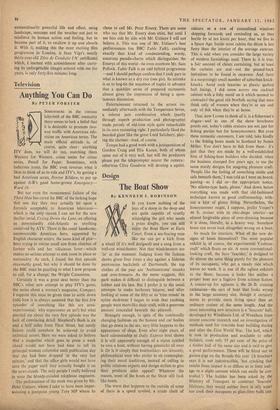Television
Anything You Can Do
By PETER FORSTER
SOMEWHERE in the curious labyrinth of the BBC mentality there seems to lurk a belief that z it is desirable to promote two- way traffic with American tele- vision on American terms. The main official attitude is, of course, quite clear : anything ITV does, we will do too, matching them Western for Western, crime series for crime series, Pencil for Paper. Sometimes, with ludicrous irony, the BBC even reverses what it likes to think of as its role and ITV's, by getting a bad American series, Doctor Kildare, to put up against A-R's good home-grown Emergency— Ward 10.
But not even the monumental failure of the Third Man has cured the BBC of the lurking hope that one day they may actually hit upon a formula acceptable to American television— which is the only reason I can see for the new thriller serial, Crying Down the Lane, an offering as determinedly mid-Atlantic as anything contrived by ATV. There is the usual handsome, unmemorable American hero, supported by English character actors; the same kind of plot— hero trying to rescue small son from clutches of former wife and her villainous lover—which makes no serious attempt to sink roots in place or nationality. As such, I found the first episode reasonably good, but why it should be done by the BBC must be puzzling to what I now propose to call, for a change, the Wright Committee.
Certainly it was a great deal better than the BBC's other new attempt to play ITV's game, the series about a woman's magazine, Compact. I suppose this must be given time to settle down (odd how it is always assumed that the first few episodes of something like this are semi- experimental : why experiment on us?) but what puzzled me about the very first episode was the lack of convincing detail. Shepherd's Bush is six and a half mites from Fleet Street, but surely liaison could somehow be achieved to avoid technical errors. Here we were asked to believe that a magazine which goes to press a week ahead would not have had time to tell its principal woman columnist until publication day that she had been dropped 'at the very last minute,' and that the office girls would not have seen the paper until they actually bought it on the news-stands. The only people I really believed in were the bloody-minded telephone engineers.
The performance of the week was given by Mr. Peter Ustinov, whom I take to have been imper- sonating a pompous young Tory MP whom he chose to call Mr. Peter Emery. There are some who say that Mr. Emery does exist, but until I see him side by side with Mr. Ustinov I will not believe ,it. This was one of Mr. Ustinov's best performances (on BBC Table Talk), catching exactly that kind of condescending, wordy, sonorous pseudo-charm which distinguishes the Emerys of this world—he even overbore Mr. Sam Pollock. Table Talk is an odd hybrid programme —and I should perhaps confess that I took part in what is known as a dry run (one gin). Its mistake is so to hog-tie the sequence of topics in advance that a quickfire series of prepared statements almost gives the impression of being a spon- taneous discussion.
Entertainment returned to the screen im- mediately afterwards with the Temperance Seven, a solemn jazz combination . which (partly through superb production and photography) made parody of old-time style quite remarkable in its own recreating right. I particularly liked the bearded giant like the great Lord Salisbury, play- ing the clarinet—trad, of course.
Tempo had a good week with a juxtaposition of Gordon Craig and Elia Kazan, both of whom came out of it very well, but will the producers please put the teleprompter nearer the camera : otherwise Clive Goodwin will develop a squint.






























 Previous page
Previous page